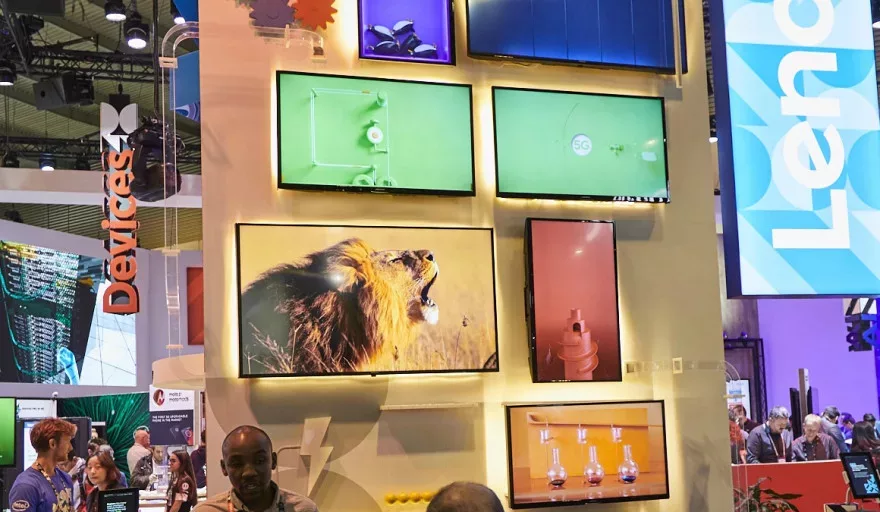Showcasing its new Yoga PC line, the AI-powered Lenovo Smart Assist and more, Lenovo’s tagline ‘Different is Better’ rings true.
“I love technology, and there’s a lot of elements to that statement.
“It’s constantly changing our world, right? The experiences you had maybe 10 or even five years ago are totally different from what they are today.”
The most recently quarterly results saw Lenovo claim the number one spot in the International Data Corporation’s PC Rankings, named the top manufacturer with sales accounting for 24 percent of the global market.
Walking into Lenovo’s MWC booth, a visual representation of this status immediately became apparent.
Surrounded by curious crowds and the company’s extensive portfolio of branded devices front, back and centre, we navigated our way to a table where self-confessed technophile Matt Bereda, Vice President of Global Consumer Marketing, was poised to tell us about the breadth of exciting new products on display.
“I love being part of what’s new and what’s going to be the latest and greatest in the industry, and Lenovo is definitely one of the best out there from an innovation perspective,” he states.
The new normal
Showcasing its new Yoga PC line, the AI-powered Lenovo Smart Assist and more, Lenovo’s tagline ‘Different is Better’ rang true at the conference.
“Our vision is very much dictated by intelligent transformation,” explains Bereda. “Right now, we’re seeing individual devices becoming completely transformed through the rising incorporation of smart technologies.
“How can I use machine learning to optimise battery storage? How do we integrate voice control in new, effective and efficient ways? Is it possible to block out background noise during videocalls? These are the sorts of questions that we’re looking to answer in order to create a much more fluid, natural, dynamic environment for the consumer.”
A company clearly pioneering IoT development, Bereda highlights that the business’s current position is largely owed to Lenovo’s flexibility, readily working with major industry influencers in order to give itself the widest possible scope and remit.
“Lenovo is a very collaborative organisation,” he affirms. “We look at what works best for us, and rarely is it productive to say we’re a walled garden that’s going to be locked down.
“We’re partnering with more traditional companies like Microsoft and Intel, and some emerging players like Amazon, Disney and Google, for example, all while engaging with the consumers themselves earlier and earlier to pinpoint what works and what doesn’t.”
Empowering engagement
This approach is no more evident than in the company’s growing presence in the mixed reality sphere.
Its flagship Mirage Solo standalone virtual reality headset incorporates Google’s Daydream VR platform, the pair having created a device that has completely transformed the functionality of these technologies for end users.
Further, Lenovo’s work with The Wild Immersion is a key showcase to this end, helping transport students into the Amazon Jungle.
“MR is a category that we feel has a lot of future potential,” Bereda states. “We’re actually demonstrating on our booth floor the applications of VR in the classroom that are unlocking new experiences in education.
“Let’s take ancient Egypt, for example. Instead of students seeing the information in a book or on slides, we can immerse the learner, allowing them to walk up instead of just seeing a flat image.”
Moreover, the company has similarly been focusing on developing enterprise applications using augmented reality, helping to benefit a range of professions such as engineers during training exercises.
“In my opinion, it’s really already an engagement gamechanger,” Bereda adds.
Broadening horizons
As part of this, enabling greater accessibility to these technologies is a growing focus of Lenovo, aiming to not only bring new capabilities to market but equally ensure that they’re made available to children of all ages and backgrounds.
“It’s an unfortunate reality that many youngsters may not get much of a chance to travel in their lifetimes,” Bereda reveals. “That’s why we see this technology as being truly influential. It can help to broaden horizons and provide a greater global outlook to many children.”
Hence, portable solutions are one of the firm’s major emphases, developing transportable infrastructure that are capable of supporting classrooms of around 30 students, allowing entire schools to gain access with reduced investment.
“We’re seeing the emergence of government grants really starting to support classrooms in this way, but equally we see it as our role to provide a VR solution that all students can easily and efficiently benefit from,” Bereda adds.
Nominated for Best Mobile Innovation for Education by event organisers GSMA off the back of its Virtual Reality Classroom efforts, Bereda is optimistic that the coming year will continue to show similar promise within this sphere.
“How my kids engage with technology is totally different from how I interacted with it as a youngster,” he muses, reminiscing about overhead projects and smart whiteboards. “Their perspective on technology is completely different from mine, they’ve grown up with it and it’s something they can relate to much more, and this makes it perfect for education.”



















